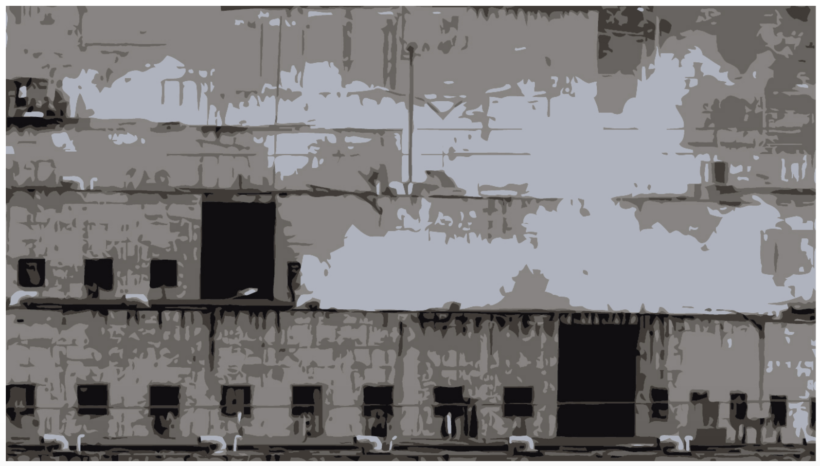Massacre in prisons (Image taken from Corredores migratorios website)
Mass killings in prisons cannot be normalised in our sensibilities or in politics. The massacre that took place in the early hours of 13 November at the Penitenciaría del Litoral is not just another event: we believe it should be treated as part of a systematic extermination.
Historically, places with similar crimes have been called “prisons of extermination”, genocide or summary executions. Beyond the definitions of law, we want to highlight the feelings of the families of the murdered people and of those who resist the normalisation of this violence. We are undoubtedly living in a logic of extermination and extreme abandonment that produces death. The social upheaval that overflows and spreads makes the word crisis insufficient, it is better to consider it legal state violence.
The mere fact that this reality calls for the words extermination, genocide, lèse humanité, social cleansing, is telling us that there are no words that are enough.
The national government declared a state of emergency on 18 September due to “internal commotion” in order to intervene directly in the country’s security. This new tragedy shows the opposite, a deliberate passivity.
We would like to propose two words: “in-human” and “in-action”. The inhuman is paradoxically only possible through the action of other human beings. The same prefix is used for in-action: absence of movement, the decision not to move.
Ecuador’s national government has taken the policy of inaction as a position to deal with the problems of what it calls “security”. Despite the continuous warnings made by hundreds of prisoners and their families, by anti-prison social movements and human rights organisations, these warnings have not been listened to, only placed in the false dialogue, a cleansing of faces that should be understood as an extension of this policy. The deliberate installation of confusion, the bureaucratic treatment of life and the stimulation of barbarism are inhuman. Inhumanity and inaction characterise the actions of this government with regard to mass murder.
Legal violence as a political technique expands from prisons to the population through surveillance of public life, punishment, perpetuation of poverty, irregularisation of migrants, practices of exclusion, racism and other modes of administration of life. This is how, in its most literal sense, government decides how we live and in what ways we may die.
In today’s massacre, 13 November 2021, a significant number of those killed did not have convictions. As in the rest of Ecuadorian prisons, many people are locked up under the abusive regime of pre-trial detention, those who have the legal status of innocence. We also know that Helen Maldonado, a trans* woman, whose constitutional right was to be in a women’s ward, was killed in the massacre. The defender of the Molleturo struggles, Victor Guaillas, was also murdered. He was in prison accused of the crime of “sabotage” in the context of the social protests of October 2019. Helen and Victor are two of the people killed for previous violations of their human rights.
Donald Winnicott said that “if you fear something happening, it is because it has already happened”. Although this is not the first event so far in 2021, the continuing return of such violence is reminiscent of similar events in Ecuador. The events of the past, like those of the present, have important political differences, but regardless of political lines, geographies and time, we observe the crystallisation of a way of governing that keeps a clear evolution with respect to the creation of a culture of surveillance, fear, passivity and silence.
We want to affirm that this massacre must be investigated as a state crime, but can we speak of genocide? Genocide is understood as the deliberate annihilation of a human group by another group. Prison violence reveals at least the trajectory of this form of targeted killing, where the perpetrator uses a third party to bathe his hands in blood.
It is a mass murder targeting people historically excluded because of their economic, ethnic, migratory, gender orientation or gender identity status. Considering the responsibility of the state and the dimension of the extermination is necessary to give a forceful weight to the facts and their previous and subsequent relations and, even more, to confront the dynamics of contemporary “democracies”, which install silence and collective trauma as a way of doing politics.
We engage with bereaved families, broken by permanent uncertainty. We seek words to resist the bureaucratisation of death and the use of law that makes life an administrative problem. We demand the dismantling of the prison system, which is a system of death.
We condemn that the realities of migration, crimes of poverty, abortion, traffic accidents, are subtracted by the prison logic to be inscribed in its perimeters of death. Other forms of governance are possible. We will not stop demanding them and we will build every day an anti-prison social fabric that opposes the legal violence of the state.
It is not possible to live in societies of contempt, we are capable of building others, and new meanings for justice, for the encounter between different people, without prisons that institute our relationships. No more telephone goodbyes resigned to imminent death, no more deadly imprisonment, no more dismembered bodies, no more broken families, no more indolence.
More information: Faced with the normalisation of mass murder in Ecuador – Corredores Migratorios http://corredoresmigratorios.com/ante-la-normalizacion-del-asesinato-masivo-en-ecuador This content is generated by Corredores Migratorios






